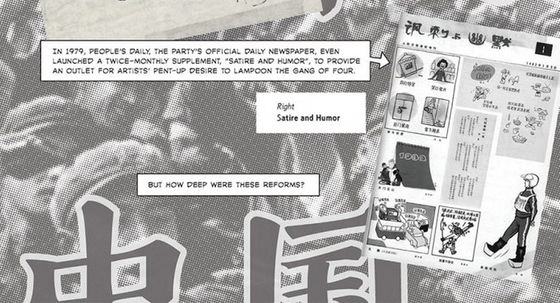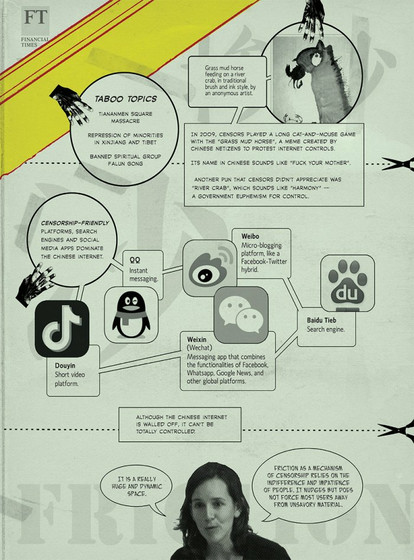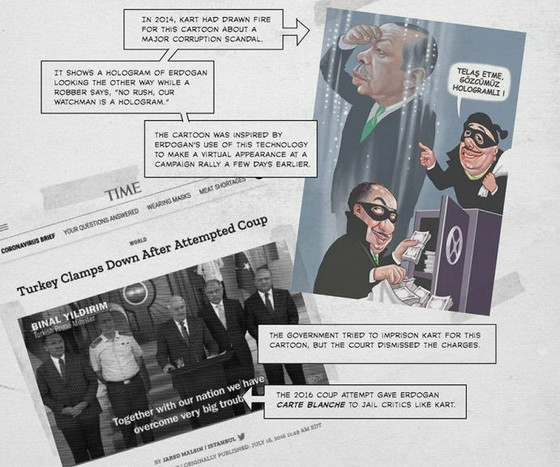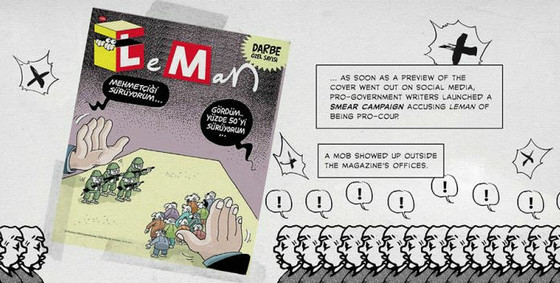What is the reality of modern 'censorship' in China and Turkey that regulates satirical manga and anti-government opinions?

Satirical manga that humorously depict or criticize political and social issues have often been attacked by those in power, including censorship and injunctions. MIT Press, a publishing station affiliated with the Massachusetts Institute of Technology (MIT), explains the censorship faced by political satirical manga artists in China and Turkey, where control systems are becoming stronger.
An Illustrated Guide to Post-Orwellian Censorship | The MIT Press Reader

The image below is an illustration expressing the words ``Censorship is the power to decide that 2 + 2 becomes 5, or 3, or whatever the authorities say.'' Antonio Gramsci , a 20th century Italian thinker, expressed censorship by power as follows: ``Rules conceal their coercive nature through the consent of the ruled, and when they can hide their coercive nature, they achieve hegemonic control.'' I am.

In addition, through her analysis of totalitarianism,

“The world’s longest continuously

Furthermore, under the Deng Xiaoping administration in the 1980s, modernization and market revitalization were prioritized over communist ideology, and the scope of artists' activities expanded significantly. However, since 2012, when Xi Jinping became party leader, there has been a major reversal, with emphasis placed on the purity of communist ideology and the cult of personality, and the government has emphasized further repression of opposition.
However, regarding China's administrative system, Mr. George said, ``China is too vast and has too many people, there is a large amount of media, and authority is too dispersed, so complete Mao Zedong style control is impossible.'' ” states. Similarly, political scientist Margaret Roberts pointed out, ``Even under strict control, China's censorship practices are full of holes, and cases of evasion with impunity are common.'' Above, he talks about how censorship is implemented in such countries, saying, ``Modern Chinese censorship is implemented through a combination of 'fear,' 'friction,' and 'flooding.''
George points out that 'fear' is at work in most management positions in China's domestic news media and internet platforms. If incorrect information is inadvertently published in the media or various platforms, it may not result in hard labor in a concentration camp, but it may result in immediate demotion and make it difficult to get promoted again.
In addition, journalists, artists, etc. are sometimes treated as ``invited to tea.'' This seems to have the effect of 'intimidating' the other party by having a private conversation over tea, when public punishment by the government might backfire.

The 'friction' that Roberts cited as China's censorship method is not to restrict satirical artists or their works themselves, but to make it difficult for artists to access various content and items and make their activities inconvenient. is. Mr. George describes the Chinese Internet as a ``walled garden,'' and says that accessing prohibited sites using circumvention tools such as VPNs has become difficult in recent years.

Roberts' third item, ``flooding,'' refers to distracting from or diluting the impression of the content you want to regulate. In some cases, Chinese authorities are posting about 1.2 million comments a day by troll teams amplified by bots. This allows them to mass-produce government propaganda, low-quality opinions, and completely unrelated posts that change the subject, making it difficult for others to see the content they want to control.
Unlike China, Turkey is not a one-party dictatorship and has many private media outlets. As such, Turkey has a rich history of satirical cartoons, but like China, has modern authoritarian censorship.
Musa Kart, director of Turkey's oldest independent newspaper, turned a major corruption scandal into a comic in 2014. Here, President Erdoğan used a hologram effect when appearing remotely at an election rally, so an illustration of people robbing the security guard saying, ``They can steal as much as they want because the security guard is a hologram'' is drawn.

The Turkish government tried to imprison Mr. Kurt because of this manga, but the court rejected the lawsuit. However, Mr. Kurt was subsequently imprisoned on suspicion of supporting a terrorist organization during the 2016 coup attempt. The imprisonment of Mr. Khat and others greatly strengthened Erdoğan's power, as open repression serves as a warning to others.
Moreover, Turkey's censorship is a classic case of 'media capture,' George said. Although there is not a high level of press freedom in Turkey, there are always newspapers that can criticize the government, and there are also many privately run media outlets. However, Mr. George points out that private media are profit-oriented and depend on government licenses, contracts, and subsidies, and are financially exposed to political blackmail.
The rise of digital media is believed to be a reason why the Justice and Development Party has increased its power over the media. Salihu Memekan, a former manga artist, said, ``In the past, many people subscribed to newspapers to hear the voices of columnists and manga artists, even if they disagreed with the editor. However, with the advent of digital media, newspapers began to lose sales revenue, and editors began to prioritize government contracts over readers,'' he said, explaining the reason for his resignation.
Censorship and regulation have been strengthened due to oppression, but Turkey's satirical art culture is said to date back to at least
On the other hand, Tunkei Akgün, a former manga artist who founded Leman, said, ``President Erdoğan has many supporters, and his supporters flock together to carry out repression, so it has become harder to determine the borderline of repression than before. 'It's becoming difficult,' he said of the difficult current situation. After the coup attempt in 2016, Leman's cover depicting civilian rioters alongside coup soldiers sparked a smear campaign from pro-government writers and a mob outside the magazine's office. It seems that it was packed.

Related Posts:
in Note, Posted by log1e_dh







